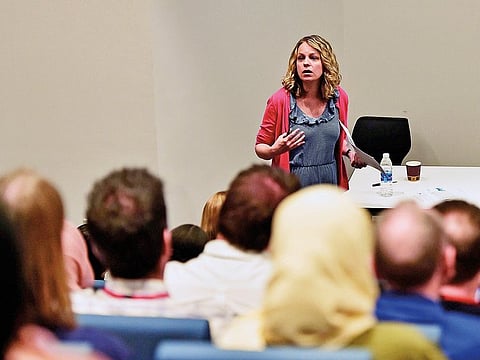Teachers quiting because of ‘audit culture’, expert warns
Dubai conference looks at why teachers today are a demotivated lot

Dubai: Many teachers quit their jobs frustrated by interference from education regulators and school leaders, an expert warned at the first ResearchEd event in the UAE on Saturday.
Visiting UK education analyst Rebecca Allen, a former teacher, said an “audit culture” is “threatening teachers’ sense of autonomy, competence, and relatedness” in the classroom.
Speaking at the event, held at Dubai College, Allen said teachers should not be subjected to a “centralised and standardised” performance audit because teaching is “unlike many other professions” — in that “it takes place in the private in the classroom and the quality of learning, as an outcome, is a curious thing because it takes place in the children’s minds — it’s really hard to measure”.
The audit culture means that in many schools teachers no longer get to decide how to prepare lessons, how to mark students’ work, how to assess and how to record learning.Rebecca Allen | Education analyst from United Kingdom
“But now, in England, teachers are required to create a paper-trail that proves that learning has happened in the classroom, for people who are not present in the room at the time,” Allen said, referring to school inspectors and head teachers.
“And the audit culture, as a consequence, means that in many schools teachers no longer get to decide how to prepare lessons, how to mark students’ work, how to assess and how to record learning.”
Allen, co-founder and chief analyst at Teacher Tapp, said “these perceived cultures of control” are demotivating teachers, pushing many to the point of resigning.
Allen, who has been researching and writing about schools for the past 15 years, also questioned “why we thought it would be necessary for teachers to have standardised ways of getting feedback [from school leaders] on how to teach effectively”.
Allen, co-author of the 2018 book ‘The Teacher Gap’, said: “The jobs you teachers do are so diverse because of the different subjects you teach, the different types and ages of students you teach, that the idea that standardising feedback helps inform teaching in the classroom seems nonsense to me.”
The ResearchEd event was part of a two-day ‘Innovation in Education Conference’ at Dubai College. The first day (Friday) featured the Council of British International Schools organising talks and panel discussions.
‘Misinformation on innovation’
Michael Lambert, headmaster of Dubai College, said: “As proud supporters of the Knowledge and Human Development Authority and the UAE’s vision for the future of education, we wanted to host a conference exploring innovation in education from a range of perspectives. There is so much misinformation about what constitutes innovation in education — typically we are simply told we need to be using digital technology.”
“In truth, some of the most sophisticated research in education comes from the disciplines of neuroscience and psychology, both of which teach us how and when students learn best. For this reason we have teamed up with Tom Bennett, founder of ResearchEd, a research-informed teach meet in the UK, as well as … other well-regarded educators to guide us.”
Lambert added: “There is always so much at stake in education, perhaps now more than ever, with governments and corporations often telling us what and how they want us to teach when, in fact, frontline practitioners supported by solid research are often best placed to tell governments and corporations what they should be seeking from their citizens.”
‘Myth-busting’ day
ResearchED events are typically held on a Saturday at a school.
“Researchers, teachers, and policymakers come together for a day of information-sharing and myth-busting”, ResearchEd says on its website, researched.org.uk
Its founder Bennett told Gulf News the process of introducing Edtech (education technology) is often upside-down.
“Tech manufacturers in education usually start with a product and think ‘how can we use it in the classroom’, which is OK, but that’s not really a practitioner-led model. And what we’re seeing now is, through ResearchEd and international evidence-informed discussion in education, better synergy between tech manufacturers and tech consumers in schools to solve problems teachers actually have — rather than shoehorning them on top in a very artificial way.”


